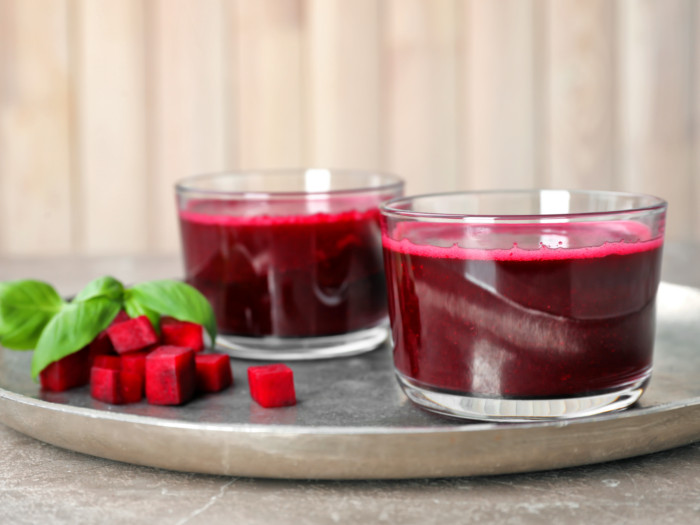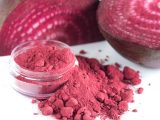A glass of freshly made beetroot juice or beet shot is one of the most popular ways to improve your health and make your skin glow. Most detox programs and juice cleanses also prescribe beetroot juice or beet salads. However, an excess of beetroot juice can be harmful. Beetroot juice side effects may include beeturia, colored stools, stomach cramps, and low blood pressure. Let’s find out more.
Beetroot Juice Side Effects
Let us look at the possible side effects of drinking beet juice.
Beeturia
In some people, excessive beetroot consumption can cause beeturia, where the urine color may range from pink to dark red. According to the NCBI, beeturia occurs in 10-14 percent of the population. People who are iron-deficient or have a history of malabsorptive diseases are more prone to urine discoloration. It usually goes away when beetroot or beet products are avoided. However, it is advisable to check with your doctor to rule out any underlying health issues like anemia. [1]

Drinking excessive beetroot juice can cause beeturia. Photo Credit: Shutterstock
Kidney Stones
If you are prone to kidney stones, you may want to exercise caution while having beets or beet juice. They are high in oxalates, which form crystals in the body and develop into calcium oxalate stones. According to a Clinical Nutrition Research report, foods like beets, beet greens, rhubarb, and spinach are high in oxalates. People having beet supplements like beetroot powder or beet juice powder should be careful as these products are quite high in oxalates. [2]
The oxalates may also contribute to the development of gout, a health condition that occurs when uric acid accumulates in the body and causes sharp pain in the joints. They may also cause flare-ups in people who already have gout. [3]
Colored Stools
Beet juice and foods containing beets or red food coloring may cause stools to be reddish. This is harmless; however, you may want to inform your doctor and additionally keep a check on your diet to rule out the presence of blood in your stool. [4]
Anaphylaxis
A case report in the Clinical and Translational Allergy journal documented a rare case of a 13-year-old girl who complained of urticaria and asthma about 40 minutes after eating boiled beetroot. She had a previous history of wheezing until she was five years old. The young girl underwent food challenge tests to find out more about the allergy and experienced symptoms of anaphylaxis, including generalized hives, throat tightness, and bronchospasm, on the ingestion of boiled beetroot. However, this is a rare case of an extreme beet allergy. [5]
Detox Flu
Beetroot salad and beetroot juice are usually included in several detox diets and juice cleanse programs. You may experience stomach cramps, diarrhea, fever, or chills when the body is on a detoxification drive. Always seek help from your doctor or a registered dietician before having any detox juice in excess. Also, the National Center for Complementary and Integrative Health warns that some detoxification programs can be unsafe and falsely advertised. The report states that a 2015 review concluded that there was no compelling research to support the use of detox diets for weight management or eliminating toxins from the body. [6]
Other Beetroot Juice Side Effects
A 2018 report in the Biomolecules journal suggested that beetroot juice can be promoted as part of a healthy lifestyle to control blood pressure in healthy and hypertensive people. However, beetroot juice supplementation may interfere with blood pressure medications. Also, individuals with low blood pressure should check with their doctor before having beetroots and beet products regularly. [7]
FAQs
Is it OK to have beetroot juice every day?
Currently, there are no official dosage recommendations for beetroot juice. If you are having beetroot juice every day for health supplementation, it is best to check with a registered dietician nutritionist for the optimal dosage. Beetroot powder and beet juice powder usually come with package instructions on daily and weekly dosages.
What is the best time to drink beetroot juice?
Most people prefer to have juices first thing in the morning on an empty stomach. However, this is no verified evidence of the benefits of drinking juice in the morning. Also, beetroot juice and beetroot concentrates are used by athletes to boost performance. There is no official dosage or timing for the beet supplementation; however, a 2018 study found that 28 trained male cyclists had higher efficiency and increased blood flow after taking 100mg of beetroot concentrate every morning for a week. [8]

